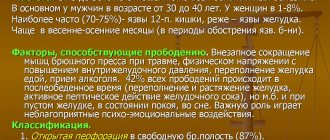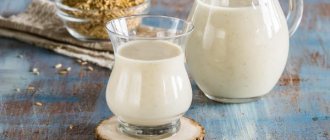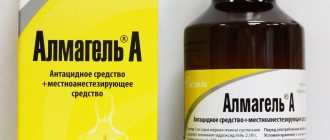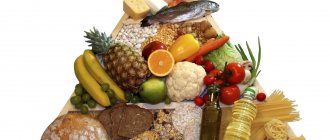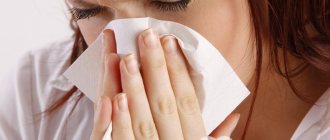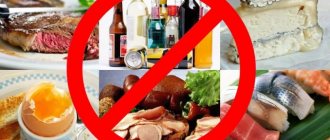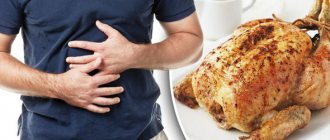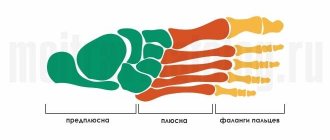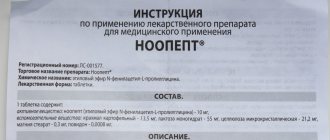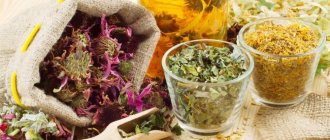The cause of food poisoning is the consumption of low-quality products, infection with viruses and bacteria, and failure to comply with personal hygiene rules. In this case, the body resists further food intake - the patient experiences nausea, vomiting and stool disorders. However, during the recovery period it is possible and even necessary to eat - a properly selected diet in case of poisoning can speed up recovery and normalize the functioning of the gastrointestinal tract.
Diet for food poisoning
After poisoning, the body is always dehydrated, so try to drink more fluids. For this, ordinary non-carbonated mineral water, strong black tea, dried fruit compote, and rosehip tea are suitable. Drink as much water as your body requires.
Now let's touch on those foods that you need to categorically exclude from your diet for several days, and maybe weeks:
- Salt, pepper, sugar, spices and seasonings;
- Canned food and products containing preservatives;
- Semi-finished products;
- Oil;
- Ketchup, sauces, mayonnaise;
- Fatty meat and fatty fish;
- Raw vegetables and fruits; Fermented milk products;
- Products that lead to fermentation and rotting in the stomach;
- All types of sweets;
- Any sweet and carbonated drinks;
- Alcohol.
As you already understand, the diet must be strict and excludes almost all everyday food. Absolutely avoid fatty and protein foods. Switch to foods that are easy for your stomach to digest.
What can you eat when using a diet for food poisoning:
- Only boiled or steamed food;
- Weak meat broths;
- Buckwheat, rice and oatmeal;
- Day-old white bread;
- Cooked meat;
- Mashed potatoes;
- Green tea or rosehip tea.
Home-cooked dishes such as:
- soup pureed from vegetables;
- steamed meat cutlets (from day 3 of the diet);
- casseroles, soufflés and cottage cheese puddings;
- dry biscuits;
- steamed fish meatballs;
- buckwheat and rice on water;
- boiled and baked vegetables;
- dill infusion;
- chamomile and rosehip tea (with a small amount of honey);
- still mineral water;
- non-sour fruits, boiled and baked (pears, apples);
- rice soup;
- homemade crackers;
- meat soufflé;
- steam omelette;
- fruit jelly (from day 3).
Reviews and results
In case of acute food poisoning, diet is the most important component of complex treatment and, according to reviews from most patients, it is effective and promotes rapid recovery.
- “... After eating watermelons, severe diarrhea began, vomiting appeared and the temperature rose. Later, severe headache, dizziness, weakness, and shortness of breath appeared. A doctor was called and diagnosed food poisoning (nitrates). Even before the doctor arrived, we began to rinse our stomach and drank several tablets of white activated carbon. It is recommended to drink plenty of fluids, take saline solutions, and eat a diet excluding meat, fats, sweets, raw vegetables and fruits. And only after 3 days the stool became more or less normal, and the vomiting stopped. The effects of poisoning were felt for a long time, and I had to be on a diet for almost a month. Now I am very careful about all early vegetables and fruits”;
- “... I was poisoned at a friend’s wedding by a cake, from which, as I was told, they managed to isolate staphylococcus. The cake was ordered to a private person and was prepared at home, obviously in violation of technology. 12 people were poisoned. There was a fever, cramping abdominal pain, diarrhea, severe vomiting, lethargy, and weakness. At the ambulance the stomach was washed out and enterosorbents were given. All were hospitalized in the infectious diseases department. They prescribed a drip with saline solutions, antispasmodics, and enzyme preparations. I was discharged on the 4th day and prescribed a diet with plenty of fluids, which I was on for two weeks.”
Basic rules of nutrition for food poisoning
The purpose of the diet for food poisoning is to ensure maximum comfort of the digestive tract, which is achieved by chemical, mechanical and thermal sparing.
During poisoning, diarrhea and vomiting occur, often uncontrollable, therefore the objectives of therapeutic nutrition are:
- restoration of electrolyte balance;
- reduction of dehydration and inflammatory reaction of the gastrointestinal tract;
- acceleration of mucosal healing processes.
Among other things, it is necessary to replenish the body with proteins, vitamins and minerals.
According to the Pevzner classification, the diet for food poisoning is treatment table No. 1a.
Daily requirement of proteins, fats and carbohydrates:
- fats – 80-90g, of which at least 20% vegetable fats;
- proteins – 80g, of which up to 60-70% are proteins of animal origin;
- carbohydrates – 200g.
Due to the restriction of nutrients in case of food poisoning to the lower limit of the physiological norm, the daily calorie content of the diet is 1900-2000 kilocalories.
Table of permitted and prohibited products
In accordance with the recommendations of the Ministry of Health and WHO, lists of recommended foods and those that are not allowed are compiled.
Vegetables and greens
| Allowed | Prohibited |
| Beet | Cabbage of any variety |
| Zucchini | Tomatoes |
| Pumpkin | Turnip |
| Potato | Radish |
| Cucumber | Garlic |
| Onion | Pepper |
| Carrot | Beans |
| Sorrel | Green onions |
| Dill | Parsley |
| Nettle | Celery |
| Asparagus | Cilantro |
| Lettuce leaf | Spinach |
| Arugula | Sorrel |
| Basil | Cheremsha |
Fruits and berries
| Allowed | Prohibited |
| Citrus | Cherry |
| Banana | Cherries |
| Apricot | Melon |
| Avocado | Watermelon |
| Strawberry | Plum |
| Cranberry | Currant |
| Apple | Grape |
| Pear | Peach |
Nuts and dried fruits
| Allowed | Prohibited |
| Raisin | Peanut |
| Walnut | Prunes |
| Hazelnut (hazelnut) | Date fruit |
| Almond | Figs |
| Pistachios | Other dried fruits |
| Cashew | Candied fruit |
| Dried apricots (decoction) | Fruit and nut mixtures |
Cereals and porridges
| Allowed | Prohibited |
| Yadritsa (buckwheat) | Pshenka |
| White milled rice | Pearl barley |
| Cereals | Corn |
| Semolina | Pea |
| Linen | Barley |
| Wheat | Spelled |
| Brown parboiled rice | Bulgur |
Bakery and flour products
| Allowed | Prohibited |
| Homemade crackers | Pies |
| Bread | Bread of any kind |
| Baguette (dried) | Cookie |
| Biscuits | Baranki |
Confectionery products
| Allowed | Prohibited |
| Paste | Cakes, chocolate |
| Marshmallow | Cake |
| Marmalade | Oriental sweets |
Seasonings for dishes
| Allowed | Prohibited |
| Salt | Ginger, garlic |
| Bay leaf | Mustard |
| Peppercorns | Lemon acid |
| Carnation | Sauces and pastes |
| Cinnamon | Hot pepper |
| Mint | Spices |
Dairy and fermented milk products
| Allowed | Prohibited |
| Kefir | Milk |
| Organic dairy product | Cheese |
| Yogurt | Sour cream |
| Ryazhenka | Cream |
| Curdled milk | Butter |
| Cottage cheese | Colostrum |
Livestock and poultry meat
| Allowed | Prohibited |
| Chicken fillet | Pork |
| Rabbit | Wild meat |
| Beef | Mutton |
| Game | Turkey |
Fish and seafood
| Allowed | Prohibited |
| Trout | Salmon |
| Cod | Mackerel, herring |
| Pollock | Tuna |
| Oysters | Halibut |
| Shrimps | Sturgeon |
| Caviar | Acne |
Eggs
| Allowed | Prohibited |
| Chicken | Goose |
| Quail | Turkey |
| Duck | Ostrich |
Soft drinks
| Allowed | Prohibited |
| Green and black tea | Coffee |
| Infusion of rosehip, dill, linden | Cocoa |
| Dried fruit compotes | Tomato juice |
| Kissel | Chicory |
| Morse | Sparkling water, lemonade |
| pumpkin juice | Concentrated fruit juices |
| carrot juice | Smoothie |
In case of poisoning, calculate the amount of proteins, fats, and carbohydrates consumed:
- the first and second are taken in equal proportions;
- 70% of proteins should be of animal origin;
- Complex carbohydrates are consumed in large quantities.
The lack of one of the nutrients leads to the fact that the nervous system loses control over the body, which begins to work “for wear and tear.”
In case of poisoning, nutritionists use a specific menu. Products should promote digestion and remove toxins without creating a burden on the gastrointestinal tract. To diversify the diet, the number of meals is doubled. At the same time, diet adjustments are made daily and taking into account the general state of health.
Basic principles of nutrition after poisoning
Diet
Meals should be fractional, up to 6-7 times a day. In the first three days, the volume of food is 150-200 ml, then gradually increases. Frequent meals in small portions reduce the load on the irritated mucous membrane of the digestive tract, allow food to be absorbed, which is quite problematic with diarrhea and vomiting, gradually stimulate the appetite and activate the digestive tract.
Drinking regime
In case of food poisoning, it is very important to maintain a drinking regime. You should take at least 2 liters of fluid per day. Firstly, it helps remove toxins from the body, and secondly, it restores the volume of the vascular bed and prevents dehydration. On the first day after poisoning, it is better to avoid eating altogether and only drink. The liquid is taken in small portions (50-100 ml) every 30 minutes, since large volumes of drinking provoke vomiting. You can use boiled or mineral water without gas, as well as special solutions from powders (“Hydrolit”, “Oralit”, “Regidron”).
Cooking
Considering that the diet should provide mechanical sparing of the gastrointestinal tract, the food must contain boiled or steamed dishes in a mashed or pureed state. The minced meat is turned twice. Thus, the load on the stomach and all digestive organs is significantly reduced, they work in an economical mode, and nutrients are better absorbed. In addition, you must chew your food thoroughly.
Temperature
Food and liquid consumed must be served warm (15-50°C). Food that is too cold or too hot causes reflex spasms of the sphincters of the stomach and esophagus and promotes vomiting. In addition, cold or hot food irritates the damaged epithelium of the digestive tract and slows down regeneration.
Salt
Table salt consumption is somewhat limited: up to 6-8g per day. Too salty food and drink irritate the gastrointestinal tract and prevent the restoration of its mucous membranes.
Alcohol
During treatment, especially in the first week, when the diet is strict, the consumption of any alcoholic beverages is prohibited. Alcohol has an irritating effect on the digestive organs, interferes with regeneration processes, and provokes vomiting. If this condition is not met, the liver and kidneys, which were particularly damaged during the attack by food toxins, will begin to function even worse.
Diet duration
The duration of a strict diet is approximately 4-7 days. The return to normal nutrition is carried out gradually and with caution: one or two new dishes/products are introduced per day.
Prevention methods
An adult can minimize the possibility of poisoning. The main thing is to exclude favorable conditions for the growth of pathogenic microflora, maintain personal hygiene and avoid overdose of alcohol or medications.
Basic Rules:
- for adults, minimize the consumption of alcoholic beverages;
- Take medications strictly according to the instructions and recommendations of the attending physician;
- keep all food cutting surfaces, cooking surfaces and kitchen utensils clean;
- wash your hands with soap before eating;
- monitor the freshness of dishes and the quality of their storage;
- rinse egg shells under running water before breaking them;
- Soak fruits, vegetables and herbs in water for 20-30 minutes before eating;
- Defrost meat and fish in the refrigerator or microwave. Do not leave them in water for a long time;
- Before buying products in a store, check their expiration date, pay attention to the packaging, availability of manufacturer’s contacts and storage conditions;
- Do not leave heated food on the stove for a long time;
- do not leave prepared meals with raw meat, fish or vegetables on the same shelf in the refrigerator;
- It is necessary to wash your hands after public transport, visiting places with large crowds of people and using the toilet.
By observing all the vaccinations every day, you can protect yourself and your loved ones from possible intoxication and the development of unpleasant diseases that are caused by pathogenic microflora.
Diet menu for poisoning
First day:
Morning: Tea with rosehip. Lunch: Homemade crackers (cut white bread into small pieces and put them in the oven, being careful not to burn them) and weak green tea at room temperature; Evening: 50-100g oatmeal (without salt and sugar).
Second day:
Morning: Vegetable broth with white rice and 2 slices of white day-old bread. In this case, the broth cannot be salted or any seasonings or spices added to it. Lunch: For lunch you can prepare mashed potatoes and lean steamed fish fillet. Evening: Homemade crackers and dried fruit compote (dried: apples, pears, dried apricots).
The third day:
Morning: Chicken broth with potatoes; Lunch: Steamed meatballs from tender and well-twisted chicken meat; Evening: Plain unsalted crackers with mint green tea.
This menu can be followed for the first week after poisoning. In the second week, you can include some fresh fruits and vegetables in your diet. Also, during the second week, expand your diet with other foods, but on condition that they are light and do not put too much strain on the stomach. In the third week, gradually return to your usual diet.
Diet for poisoning: drinking regime
If you have to refuse food until all symptoms of poisoning stop, then you should not limit yourself in drinking. The liquid replenishes mineral reserves, prevents dehydration and removes toxins from the body. The diet for children and adults involves drinking weak, warm black unsweetened tea and boiled water in the first two days. You need to drink in small sips, half a glass at a time. This is necessary in order not to induce vomiting. If you are craving salty foods, then the body urgently needs chlorine and sodium ions.
A diet for food poisoning will help make up for this deficiency. Dissolve a teaspoon of salt in a glass of boiled warm water. Potassium ions are replenished by drinking unsweetened compotes or vegetable decoctions. Boil 3 peeled potatoes or carrots in a liter of water. Strain the broth, add salt and take half a glass every half hour. Or cook a sugar-free compote from two bananas or 100 g of dried apricots, boiled in a liter of boiling water for 20 minutes.
If you suffer from pain in the intestines or stomach, they can be easily eliminated with a decoction of potato starch. Dissolve a tablespoon of powder in a glass of boiled water and drink on an empty stomach.
The diet for poisoning in children and adults recommends taking the following decoctions of medicinal herbs that will help treat poisoning without complications:
- mix dry herbs of chamomile, St. John's wort, and peppermint in equal quantities. Pour half a liter of boiling water over a tablespoon of the mixture. Let it sit for half an hour and strain. Every two hours we drink a third of a glass of the resulting liquid;
- Chicory decoction will help disinfect and cleanse the inflamed intestines. In a thermos, brew a tablespoon of herb with a glass of boiling water. In the morning, strain and drink a quarter glass every 4 hours. Flax seeds are also used;
- Elecampane will help remove enterotoxins from the body. Brew two tablespoons of chopped elecampane root in a glass of boiling water. After 20 minutes, strain. We drink 4 times a day, 2 tbsp. decoction
Proper nutrition during poisoning
The main diet for poisoning is a fasting day on the water. In case of food poisoning, the body tries to get rid of toxic substances as much as possible, the mucous membrane of the esophagus and intestines are irritated and are not able to digest solid food well. For this reason, on the first day of poisoning, you need to drink a lot of liquid, which will help the body cleanse itself faster.
Remember that during this period you should not drink tea (including green), coffee, chamomile infusions or any other herbs, or alcohol. The acceptable liquid to drink in case of poisoning is boiled water (raw water can further stimulate diarrhea), table mineral water without gas or special pharmaceutical saline solutions.
It is necessary to drink in very small sips and slowly to prevent its immediate elimination from the body and ensure maximum absorption. To maintain normal water balance, you should drink a glass of water every hour or hour and a half. The water should be warm; too cold or hot will further irritate the gastric mucosa.
Treatment of salmonellosis poisoning during pregnancy
What can pregnant women do if they are poisoned by food contaminated with salmonella?
- Detoxify with sorbents.
- Drinking saline solutions.
- Diet.
- Antibiotics, the need for which is determined by the doctor.
There are several forms of salmonellosis, depending on the affected parts of the digestive tract, so the treatment of such poisoning can vary greatly. Hospitalization is necessary for moderate and severe cases. But an examination by a therapist or infectious disease specialist is required in all even mild cases of poisoning.
The consequences for the child and mother are similar to those mentioned above.
Restorative nutrition after poisoning
The diet after poisoning, which helps the body recover faster, is quite strict. In the first few days, food should be liquid, low-fat, without salt and sugar, without various hot seasonings and sauces, without vinegar or other acids.
On the second day, you can use dietary meat broths diluted in half with water or vegetable broths. Drink them in the same way as water before, a glass in small sips every 1.5-2 hours.
Starting from the third day, it is necessary to include grated boiled vegetables in the diet, and in small quantities liquid porridge with water (rice, buckwheat, oatmeal). You still need a lot of liquid per day - up to 2 liters (weak black or green tea, now you can drink a decoction of chamomile, mint or thyme).
On the fourth and fifth days after poisoning, you can introduce variety into the diet in the form of boiled dietary meat, lean fish, steamed. Vegetables only boiled or baked. These days it is allowed to eat dried bread (crackers), but no more than a couple of slices per day, or biscuits (3-5 pieces).
In the first week, the diet for food poisoning recommends minimizing the consumption of fats and carbohydrates, since the digestion of the former requires too much energy needed for recovery, and the latter can again provoke diarrhea. The body needs protein in the same amount and it is undesirable to reduce it.
Over the next two or three weeks, it is advisable to adhere to loose rules of diets based on proper nutrition. They will help avoid unpleasant consequences after poisoning and help restore intestinal microflora faster. Non-carbonated fermented milk drinks (one-day kefir, fermented baked milk, yogurt) will help with this.
You should also exclude from the menu fatty foods (fatty meats, butter), baked goods and confectionery, too spicy and salty dishes, sausages, lard and smoked foods, fast food and semi-finished products. In the first two weeks of poisoning, it is undesirable to consume dairy products, as they provoke fermentation in the stomach and can again cause diarrhea.
Diet for day 2
On day 2 after poisoning, you can expand your diet by adding the following products to the menu:
- Boiled lean chicken or turkey meat without skin (100–150 g). The body's needs for amino acids and protein should be met.
- Eggs are best eaten hard-boiled. You can eat 2 chicken eggs or 4 quail eggs per day.
- Baked apples, pears. The dish contains a lot of fiber and pectin, which improves intestinal motility.
- Vegetable soup in vegetable oil, which may include carrots, potatoes, and zucchini.
- Chicken broth is one of the best foods for poisoning. Helps replenish the loss of protein and minerals in the body, restores the mucous membrane of the esophagus and intestines. Add white bread croutons, dried in the oven, and fresh herbs (mint, cinnamon), which help the stomach function.
Food poisoning in children
For children with food poisoning, it is recommended to call a doctor. Their symptoms are exactly the same as in adults - nausea, vomiting, lethargy and weakness, abdominal pain, diarrhea. Children are not able to help themselves, so the responsibility to help them recover falls on the shoulders of their parents and other adult relatives.
Small children should definitely rinse their stomach if they are not vomiting. Then, throughout the first day, you need to give them water or a saline pharmaceutical solution (Rehydron or other analogues) to drink. First, a teaspoon at intervals of five minutes, then a tablespoon every 10-15 minutes, stretching the required hourly rate of 200 mg.
The diet after poisoning in children is not much different from that used for an adult. In the first few days (after fasting) - vegetable broths, diluted broths with dietary meat, very thin soups (from rice or buckwheat).
After 1-2 days, the transition to thicker vegetable or fruit purees is made (vegetables and fruits are first baked or boiled). Porridges are prepared with half-and-half low-fat milk. Like the diet for poisoning in adults, the diet for children recommends avoiding fatty, fried or too spicy, sour or sweet foods in the first week. It is not allowed to allow children to eat industrially produced products, mainly consisting of chemicals (chips, crackers, snacks, etc.), as this is fraught with further poisoning.
All food should be consumed warm, not cold or hot, so as not to further irritate the gastric mucosa.
The need to follow a diet
Dietary nutrition in case of poisoning is mandatory for several reasons. For example, if we are talking about alcohol poisoning, then the liver suffers greatly, which means this organ must be given a “rest” and not overloaded with heavy foods.
Regardless of the type of poisoning, the gastric mucosa suffers. And with vomiting or diarrhea, the body rapidly loses a huge amount of protein and nutrients. As a result of poisoning, the pancreas suffers greatly, especially when it comes to a child. The kidneys suffer no less, mainly due to dehydration.
How to eat properly after alcohol poisoning
After the negative influence of alcohol, the body remains in a stressful state for some time: the water-electrolyte balance is disturbed, and disturbances in the functioning of the stomach and intestines may be observed. Therefore, during this period a person needs to detoxify the body and pay special attention to their own nutrition.
The diet after alcohol poisoning should be quite strict. Many experts recommend completely abstaining from food in the first 24 hours after intoxication occurs, replacing food with plenty of drink. You should avoid carbonated drinks and water with high sugar content. Water at room temperature is best. Gradually, you can introduce foods into your diet that help restore the body.
After alcohol poisoning, you should follow recommendations that will help you eat properly during the period of poisoning:
- food should be at a comfortable temperature, not too hot, but not too cold;
- It is better to give preference to boiled, stewed or steamed dishes;
- it is necessary to maintain the ratio of proteins, fats and carbohydrates;
- split meals are effective, small portions, but often. This reduces the load on the stomach and promotes maximum absorption of nutrients;
- vegetables and fruits in the diet not only compensate for the lack of vitamins, but also help get rid of toxins.
With alcohol poisoning, the mucous membranes of the stomach and intestines are damaged by toxins that any alcoholic drink contains. Therefore, the diet after poisoning should be aimed at restoring the walls of these organs. It is not recommended to eat spicy, fatty, or sweet foods, as such dishes can only aggravate the condition of the body.
What are the consequences of not following a diet?
As a result of intoxication, the structure of the mucous membrane changes. The inner surface of the intestines and stomach is irritated. A certain period is required for the regeneration of internal organs. This usually takes about a month. In especially severe cases, you will have to go on a diet for the rest of your life.
If you neglect the basics of therapeutic nutrition, there is a risk of developing serious disorders in the functioning of the digestive system. Among them are the following:
- stomach upset;
- colitis, gastritis;
- imbalance of intestinal microflora;
- food allergy.
Expert opinion
Shoshorin Yuri
General practitioner, site expert
If you ignore recommendations for proper nutrition after poisoning, these pathological conditions can become chronic.
Diet for alcohol poisoning
Starting from the 2nd day, the list of foods that can be eaten after severe alcohol poisoning expands. If on the 1st day you only need to drink a lot of liquid, then on the 2nd and subsequent days you should make up for the lack of vitamins and microelements. Gradually, the list of foods that you can eat is expanding. They will help the body recover, without being an additional burden for it:
- homemade crackers;
- dry or biscuits;
- pureed fruits and vegetables;
- cereals boiled in water (buckwheat and rice porridge);
- boiled meat and fish, cooked in the form of steam cutlets.
On the 3rd day, it is allowed to use cottage cheese in the form of casseroles. Broths should be without meat and bones. Vegetable decoctions are best in the first days. Later you can eat chicken broth, adding small pieces of meat to it.
Stewed or steamed liver will be beneficial. As a side dish, you can prepare boiled potatoes or rice porridge.
Conclusion
The symptoms of poisoning are very unpleasant and can bother a person for several days. In this case, a proper diet can help. Its main postulate is that everything should be taken in liquid, pureed form, little by little, but often. It is better to take the liquid warm, in small portions, at least two liters per day. This will help remove all toxins and eliminate the effects of poisoning. Eat everything freshly prepared, boiled either in a saucepan or on a steamer. Fruit compotes, herbal decoctions with honey will perfectly restore the deficiency of salts, vitamins and microelements. Porridges, slimy soups, broths - a variety of dishes will help brighten up these gloomy days. If the diet does not bring relief, consultation with a specialist is required.
It is not necessary to poison a weakened body with medications, but in severe cases they are simply vital. In the future, try to avoid poisoning - do not eat food in an unfamiliar place, carefully check the expiration date of food, do not self-medicate - drug poisoning is much more difficult to cure. It is better to take alcohol in very small quantities and of high quality. All these precautions will help maintain your health for many years.
0
What drinks are suitable during the period of poisoning?
H2_3. If everything is clear with what you can eat during the period of alcohol poisoning: you need to strictly follow a diet, eat well and eat only healthy and light food, but with drinking drinks everything is not so simple. There are a number of recommendations that will help minimize the negative effects of alcohol during the period of poisoning:
- Large amount of water. It is she who participates in the process of membrane exchanges.
- Minerals. Since the process of absorption of minerals in case of poisoning is slowed down, still mineral water is best suited.
- Liquids, like food, should be taken in small portions to ensure maximum absorption. This will help avoid swelling, discomfort, and vomiting in case of a severe condition.
- You can drink citrus juices, rosehip decoctions, dried fruit compote and green tea.
- In case of poisoning, milk should be drunk in moderation, as it puts a lot of stress on the pancreas. The tryptophan it contains enhances the absorption of poisons and can aggravate the patient's condition. On the other hand, when consumed in moderation, milk coats the walls of the stomach and has an adsorbing effect.
The body can also tell you what you can safely eat after alcohol poisoning. During such periods, a person may develop an aversion to certain foods. This means that the body perceives them as an aggravating factor and should not be consumed yet.
What you can and cannot drink
An adult needs to drink at least 2.5 liters of liquid in 24 hours. During an exacerbation, it is recommended to drink frequently, in small portions. Drinking a large volume of water at once may cause vomiting. It is advisable to drink ¼ cup of liquid at room temperature every 30 minutes. Cold drinks can cause cramps, increase nausea, and vomiting.
You are allowed to drink the following drinks if you are intoxicated:
- water with lemon juice and honey;
- Black tea;
- rosehip infusion;
- compote of apples, pears;
- decoction of mint, chamomile;
- berry juice;
- saline solution at the rate of 1 tsp. salt, 6 tsp. sugar and 0.5 tsp. soda per 1 liter of water.
You are allowed to drink plain water. It must be boiled and cooled before use. You can make dill water. It relieves irritation of the gastric mucosa well. To prepare it you need 1 tsp. Boil the seeds in 1 liter of water for a few minutes. After 15 minutes the broth will infuse. It is cooled and drunk in small sips of 50 ml at a time.
You cannot drink only saline solution, otherwise there will be an excess of salt. It is consumed in turn with other drinks. During an exacerbation, it is recommended to refrain from tea and compote so as not to irritate the internal organs.
Expert opinion
Shoshorin Yuri
General practitioner, site expert
It is forbidden to drink carbonated water and coffee. Store-bought juices and milk are contraindicated.
Basic rules of nutrition in case of poisoning
There are 7 basic rules that the diet gives after poisoning:
- You need to follow the diet for about three days, since this period will be enough to improve digestion
- Eating foods at a comfortable temperature will help prevent irritation of the gastrointestinal mucosa
- It is necessary to make up your diet from liquid or puree dishes, since they are absorbed better than others
- It is recommended to steam or boil foods, as this will help avoid digestive problems. Read also: Diet after poisoning.
- You need to eat 5-6 times a day, but the serving size should be small
- The caloric content of the diet during the first days after poisoning should be limited
- The diet after poisoning recommends drinking more fluids, especially herbal infusions
Results
- When food poisoning occurs in an adult or child, the intestinal microflora is disrupted, which is sometimes difficult to restore.
- To help her, it is recommended to take special medications prescribed by the doctor for her recovery and adhere to the rules of the diet.
- In most cases, the last symptoms of poisoning disappear after 3-4 days, but it is recommended to go on a diet for at least another week so as not to irritate the stomach again.
- It is undesirable to eat foods that contain too many chemicals that are harmful to the body and can again provoke poisoning.
Symptoms and consequences of poisoning
Initial symptoms of poisoning may appear half an hour after toxic substances enter the body, but most often this occurs after 5-6 hours or 24 hours. It all depends on the cause of intoxication and the individual characteristics of the body.
Main symptoms of poisoning:
- loose, frequent stools with undigested food debris, flatulence;
- sharp pains and cramps in the lower abdomen;
- severe nausea, profuse vomiting, which is repeated periodically;
- fever, headaches;
- lethargy, general weakness, chills;
- lack of appetite, increased salivation.
If the patient does not take treatment of poisoning and diet seriously, the consequences for his health may be very unfavorable. In addition to severe intoxication, dysfunction of the kidneys, liver and pancreas is possible in adults.
Acute intoxication often causes ulcers, allergic reactions, arthritis, diabetes and regular intestinal disorders.
It is important to provide the victim with first aid in a timely manner and adjust the diet in case of food poisoning in order to prevent panic attacks in adults and children.
